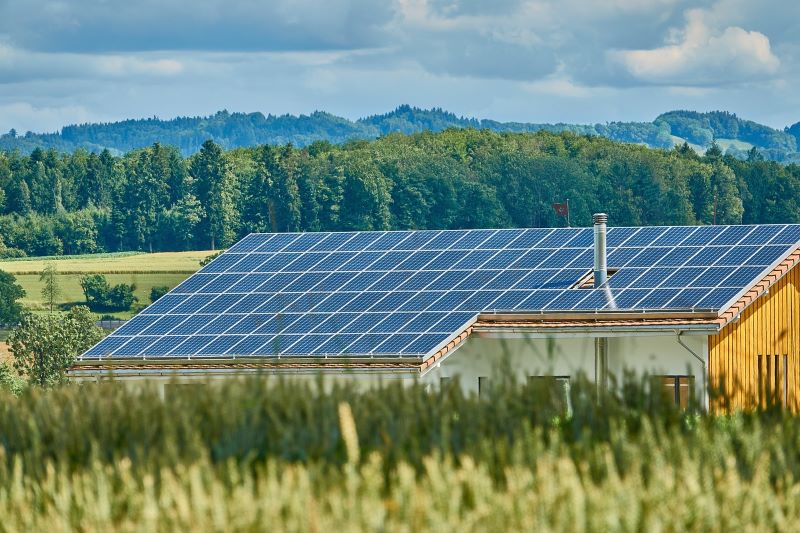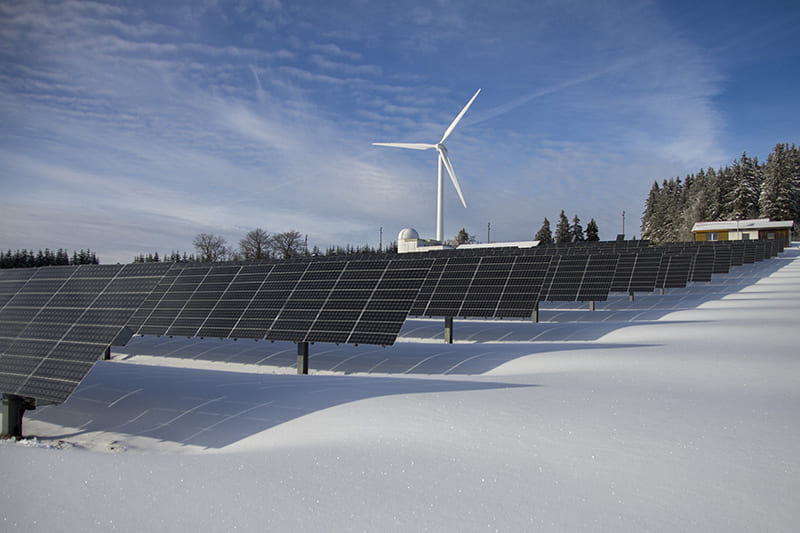
“Moving off-grid” means unharnessing your business from the power network that connects energy producers, retailers, utilities, and, finally, consumers. Off-grid businesses and homeowners are becoming increasingly common. But what does it mean? When you operate off-grid, it means your business serves as its own energy provider. You own and maintain your energy sources and reduce or eliminate your reliance on the energy company.
While it sounds promising and offers multiple benefits, “moving off-grid” is not the best decision in every case. This article will explore the options for off-grid energy generation and factors to consider when deciding if moving off-grid is advantageous for your company.
Sources of off-grid electricity
There are several electricity-generating options available for moving your company off-grid.
Solar panels
Also known as a photovoltaic or PV system, solar panels can be mounted on your roof or the ground. These panels and supporting equipment convert light from the sun into usable electricity.
Solar power is increasing in popularity, which is helping to drive prices down. If you want to rely on solar, you do need to have the space for the panels whether it be on your roof or a parcel of land behind your building. Solar panels’ effectiveness will depend on your location, weather patterns, and their directional orientation.
Wind turbines
Wind turbines harness kinetic energy, powered by the wind, and convert it into electricity. These turbines come in a wide range of sizes appropriate for any level of energy requirements.
Because they are wind-driven, this option works best in windy locations and as part of a larger system with other means of generation because, even in the windiest of cities, there are calm days. They are best placed on bluffs or ridges and in open areas where other buildings and structures don’t block the wind.
Hydroelectric
Hydroelectricity comes from harnessing the power of water to drive a turbine that generates electricity. It currently accounts for more than 70% of all the renewable electricity in the world. Typically, hydroelectric power generation happens on a large scale, utilizing dams or waterfalls to move high volumes of water. However, small and micro systems can create enough power for a single industrial plant or home.
Hydropower might work for you if water flows through your business’s property. If your access to water is limited, hydroelectricity will be less feasible. Hydro is often an excellent complement to solar power because the supply of moving water is often highest during the winter when solar panels are least effective.
Geothermal
You can harness geothermal energy in two ways.
- The most common use is heating and cooling office space. This system utilizes pipes buried deep enough to reach layers of the earth that stay warmer in winter. Fluid circulates through those pipes absorbing heat from the warm ground. It then returns to your building, where that warmth heats your space. A similar process can sometimes be used to cool a space. These systems don’t generate electricity, but they can reduce your electricity needs by handling your heating or cooling.
- Geothermal generators use the same principle, tapping into the heat found deep in the earth to create electricity via steam. However, sometimes they must go several miles underground to reach ground that is hot enough. This requirement makes them impractical for smaller applications.
Generator
A generator can be a backup system, should your other systems have an outage. Most use fossil fuels, though there are bio-fuel models available. While a generator isn’t a practical option for generating all of your company’s energy long-term, it can be a component of your off-grid system, especially if your business can’t afford to have even a brief outage.
Other considerations
Many companies moving off-grid will choose several options for generating electricity on their property. Such diversification helps ensure an uninterrupted supply of electricity. If there’s no wind to drive the turbine, the geothermal system or the solar panels can still operate. This also means your business can keep running if one system is down for maintenance.
In addition to your energy generation system, you will need supporting equipment. These items take power generated by your system and convert it to safe, usable electricity. You will likely also want a battery system to store the power so that it can be used even when your solar panels aren’t getting sun or the wind isn’t blowing on your turbine.
Reasons to consider moving off-grid
Sustainability
Because most of the options for generating your own energy come from renewable sources, moving your company fully or partially off-grid means you are reducing the emissions generated by your operations. Not only is this beneficial for the environment, but it can also help attract customers looking to work with more eco-friendly companies.
Costs
Setting up your off-grid or stand-alone system will have a significant upfront cost. However, once your system is established, your electric bills will decrease or may go away entirely if you are fully off the grid. The break-even point for your energy generation equipment will depend on many factors, including the cost of electricity, the conditions that affect your system’s efficiency, and the size of your system. For help determining your break-even point, consider seeking input from a green energy consultant.
Another benefit of going off-grid is that your utility costs will be more predictable, making budgeting easier.
Reliability
Because most off-grid systems consist of more than one generation source, they have the power of redundancy working for them. If one system goes down for maintenance, another can carry the load, at least partially.
You can further increase your reliability by having a battery storage component, which means that you won’t have an outage even when your system is generating no electricity at all. All of this makes off-grid systems highly reliable.
Moving partially off-grid
If you don’t want to move entirely off-grid, you can still utilize the same technologies to decrease your reliance on outside energy supplies and help move your company toward green operations. You can have the advantages of owning some power-generating means without committing to generating 100% of your electricity. You are still tied to retail energy providers but only use them to supplement the electricity you generate with your equipment.
There was a time when “living off the grid” was only for remote homesteads with limited or no access to traditional energy sources. As technology advances and prices continue to drop, it has become a viable option for many businesses. It can be challenging to decide whether going fully or partially off-grid is right for your business and what methods are the best fit for your operation. An energy consulting firm can assist you with evaluating your options.
Others articles you might like
7 ways sustainability benefits your business
With everything from the news to water-cooler conversations revolving around climate change and the environment, it's no surprise busines...
6 February 2024Six advantages of green energy and microgeneration for companies
Most companies rely partly or entirely on non-renewable fuels, such as coal, oil, and natural gas, to heat and cool their facilities and to ...
9 January 2024Short-term vs long-term energy contracts: How to decide which is best for your business
Your electricity procurement can have a substantial impact on your business's bottom line, which means there’s a lot to consider when it'...
21 December 2023



